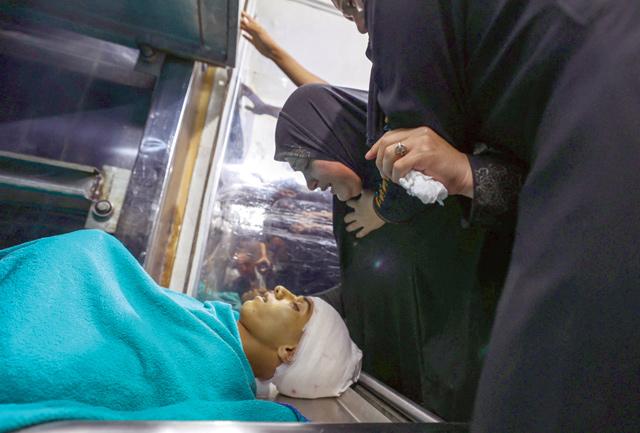- International News
- Tue-2021-08-17 | 04:37 pm

Nayrouz News Agency :
Four Palestinians were killed on Monday in confrontations with Israeli forces at Jenin refugee camp in the occupied West Bank.
Deadly confrontations have been frequent in Jenin and the flashpoint West Bank town of Beita since May, when dozens of Israeli families arrived and began constructing the wildcat settlement of Eviatar.
The latest lives lost were four Palestinians killed by "Israeli gunfire", according to the Palestinian health ministry.
It identified them as Raed Abu Seif, 21, and Saleh Ammar, 19, as well as Amjad Husseiniyah and Nureddin Jarrar.
The bodies of Abu Seif and Ammar were seen at the Jenin hospital morgue, while the Palestinian health ministry said Israeli forces had also taken the bodies of two other Palestinians.
The Israeli side confirmed it was holding the bodies of two Palestinians.
Late morning, a crowd was gathered for the funerals of Abu Seif and Ammar, whose remains were draped in Palestinian flags and carried through the Jenin camp on makeshift stretchers, AFP journalists reported.
'Heinous crime'
The Palestinian presidency condemned a "heinous crime" and held Israel "responsible for the escalation and its repercussions".
"The continuation of the Israeli policy will lead to an explosion of the situation, increased tensions and instability," presidential spokesman Nabil Abu Rudeina warned in a statement.
The official Palestinian news agency Wafa said two of the Palestinians killed had been living in Jenin refugee camp, a hot spot during the two Palestinian intifadas, or uprisings, against Israel in 1987-1993 and 2000-2005.
The two others, Abu Seif and Jarrar, were originally from the city of Jenin.
In recent weeks there have been numerous clashes between Israeli forces and Palestinians in the northern occupied West Bank, mainly in Jenin and Beita.
The inhabitants of Beita have held a number of demonstrations in recent weeks against the Israeli occupation and the settlement expansion, triggering violent confrontations.
The clashes with the Israeli security forces have claimed the lives of several Palestinians and left hundreds more injured.
Beita residents have been demonstrating since May against the Eviatar settlement set up nearby without official permission from Israeli authorities.
The settlement was evacuated in early July but Israeli army troops remain stationed there while authorities deliberate on its fate.
If the settlement is approved, its founders will be allowed to take up residence there more permanently.
Beita's residents have vowed to continue their campaign until the army also leaves the outpost.
Meanwhile, militants in the Gaza Strip fired a rocket into Israel on Monday, the army said, the first since a fragile ceasefire in May ended deadly fighting between Israel and Hamas.
There was no immediate claim of responsibility for the attack.
The rocket was fired after the four Palestinians were killed earlier Monday at Jenin refugee camp.
An army spokeswoman confirmed to AFP that it was the first rocket fire since a ceasefire on May 21 ended 11 days of Israeli aggression against Gaza.
Israeli strikes killed 260 Palestinians in Gaza, including fighters.
Since then, Israel has launched several strikes on Gaza in response to incendiary balloons sent across the border, which sometimes started fires in Israel.
Israel has enforced a blockade on the Gaza Strip for nearly 15 years.
Last week it eased some trade restrictions on Gaza, including allowing 1,350 vaccinated merchants and businesspeople into Israel for the first time since the pandemic began more than a year ago.













